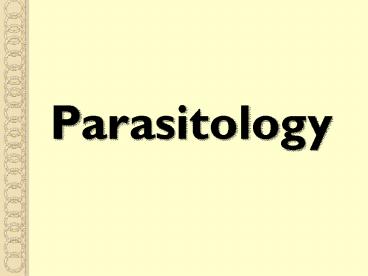Parasitology - PowerPoint PPT Presentation
1 / 32
Title:
Parasitology
Description:
Parasitology Introduction Parasitology:- It is the science that deals with organisms that live on or within other organisms (Hosts). Mainly in this course branch we ... – PowerPoint PPT presentation
Number of Views:494
Avg rating:3.0/5.0
Title: Parasitology
1
Parasitology
2
Introduction
3
- Parasitology-
- It is the science that deals with organisms
that live on or within other organisms (Hosts). - Mainly in this course branch we study the
parasites which live on the expense of man.
4
- The relationship between two living organisms
may be one of the following-
1
2
3
4
5
Continue
- ? Mutualism-
- Mutual benefits is derived from the
association of these two organisms - Benefit Benefit
6
Continue
- ?Symbiosis
- Mutual benefit , and the two organisms can not
live independently (physiological relationship). - Benefit Benefit
7
Continue
- ?Commensalisms-
- One partner benefits (commensal) while the
other (host) is unaffected. It may be
called a non-pathogenic parasite. - Benefit No harm ,No benefit
8
Continue
- ?Parasitism-
- One organism (parasite) lives at the expense of
the other (host) which usually suffer from the
association. It is called a pathogenic parasite. - Benefit Harm
9
Parasitism
Host
Parasite
10
Types of Parasites
11
Continue
- Ectoparasite-
- Live outside the body of the host
(infestation). e.g. Lice - Endoparasite-
- Live inside the host (infection).
- e.g. most of human parasite
12
Continue
- Facultative Parasite-
- Capable of leading both a free-living and a
parasitic existence (live parasitically or none
parasitically). - Obligate Parasite-
- Completely dependent upon its host and can not
lead a free life.
13
Continue
- Temporary Parasite-
- Parasitic only during part of its life cycle.
- Permanent Parasite-
- Live parasitically during the whole life cycle.
14
Continue
- Incidental Parasite-
- Can establish itself in a host in which it
does not ordinary live
(occur in abnormal host). - Pseudoparasite-
- A certificate mistaken as a parasite.
15
Continue
- Specific Parasite-
- Occurs in one particular host.
- Pathogenic Parasite-
- Causing injury to the host.
16
Continue
- Coprozoic Parasite- copro faeces
- Parasite passes the alimentary canal without
infection or contaminant faeces after release.
17
Types of Hosts
18
Continue
- Definitive Host (final or terminal)-
- Harbours the adult or mature parasite.
- In which parasite can reproduce sexually if it
applicable.
19
Continue
Definitive Host
?
??
???
20
Continue
- Main Host-
- In which the parasite occur more frequently
and reach maturity. - Secondary Host-
- In which the parasite occur less frequently
and growth is retarded.
21
Continue
- Accidental Host-
- In which its occurrence and development is
very difficult.
22
Continue
- Intermediate Host-
- Harbours the immature stage of the parasite
(larval stage) that reproduce asexually into
infective stage. - Reservoir Host-
- Animal that harbours the same species of
parasites as man and constitute a source of
infection to him.
23
Factors Affecting Prevalence Geographical
Distribution of the Parasites
24
Continue
- Availability of suitable hosts and their habits.
- Immune status of the hosts.
- Easy entry exit of the parasite to
and from the host. - Regional habits.
- Socio-economical status.
25
Continue
- Education
- knowledge about parasites reduce the
infections rates - Environmental sanitation
- water, food, waste disposal,..
- Suitability of the environmental and climatic
conditions.
26
Continue
- Control of intermediate hosts, treatment of
infected cases.ect. - Nature of life cycle e.g. parasites with simple
life cycles have more distribution than with
complicated cycles.
27
General Modes of Parasites Transmission
28
Continue
- Congenital (through placenta) e.g.
malaria - Direct Contact. e.g. arthropods, Leshmania,
Tichomonas Entamoeba gingivalis . - Indirect contact (in contaminated objects).
e.g. amoebic cyst, helminthes egg as of H. nana
, Taenia , Entrobius.
29
Continue
- In food as most parasites are intestinal and
their infective stage reach food either - In flesh e.g. T. saginata T. solium.
- In contaminated water e.g. vegetable with
protozoa cyst helminthes egg. - Contamination by insects
e.g. mechanically by housefly. - Contamination by food handler.
30
Continue
- In water drinking contaminated water with
protozoa cyst or helminthes egg or using water
containing the intermediate host, infective stage
e.g. Schistosomiasis. - Contaminated soil e.g. Ancylostoma.
- Animals e.g. dog worm (dog), Toxoplasmosis
(cat)
31
Continue
- Arthropods
- - Transmission occurs either-
- Mechanically e.g. faecal cyst eggs to food by
house fly. - Biologically e.g. malaria filariasis
( by mosquitoes), sleeping sickness (by
Tsetse fly) Leishmaniasis
(by sand fly)
32
Continue
- Praziquantel is very safe, taken as a single or
divided dose according to the worm type. - Dose is calculated according to the patient
weight. - Praziquantel is swallowed, not chewed as it is
very bitter in taste.








![[PDF] DOWNLOAD EBOOK Diagnostic Parasitology for Veterinary Technician PowerPoint PPT Presentation](https://s3.amazonaws.com/images.powershow.com/10126960.th0.jpg?_=20240909092)






















